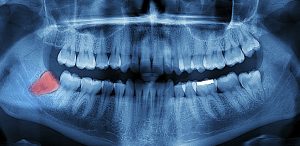 Having wisdom teeth extracted is practically a right of passage. The fact of the matter is, however, most people are not bothered by their wisdom teeth—at least not until after the surgery to remove wisdom teeth. Then, there may be stitches, swelling, a sore jaw, and a week or more on a diet of soft foods.
Having wisdom teeth extracted is practically a right of passage. The fact of the matter is, however, most people are not bothered by their wisdom teeth—at least not until after the surgery to remove wisdom teeth. Then, there may be stitches, swelling, a sore jaw, and a week or more on a diet of soft foods.
Now, however, dentists and other oral health professionals are beginning to question whether this procedure is absolutely necessary. There is evidence to suggest that for some, the risk outweighs the possible benefits. Read on to learn more.
Support for Not Removing Wisdom Teeth
Researchers are beginning to study whether or not extraction is always necessary. For people who have impacted wisdom teeth (those that are trapped below the gum line and have not erupted) that are healthy and do not cause any harmful symptoms, extraction may be superfluous.
The United Kingdom abandoned routine wisdom tooth extraction in 1998 after a study at the University of York found no scientific evidence to support the traditional procedure. In the same year, the Royal College of Physicians of Edinburgh announced removal is “not advisable” unless there is a condition related to third molars.
When is Wisdom Teeth Removal Necessary?
Of course, there are circumstances that indicate wisdom teeth should be extracted. These include:
- Wisdom teeth infection
- A cyst near a wisdom tooth
- Tooth decay
- Damage to adjacent teeth
- Jaw and wisdom teeth pain
If any of these symptoms are present, then there is likely a clear indication that the wisdom teeth—also known as third molars—need to be removed.
What Risks are Associated with Wisdom Teeth Removal?
Despite the routine nature of wisdom teeth extraction, the procedure is not without risks, including:
- Infection around the surgery site
- Dry socket, or painful inflammation in the extraction area
- Complications from anesthesia
- Lingual nerve damage
- Damage to structures near wisdom teeth or existing dental work
- Jaw fracture
- Root fragments or bone splinters left in the gum tissue
Whether or not wisdom teeth removal is necessary should be decided on a case-by-case basis. For some patients, the procedure may not be necessary. For others, the risks of extraction surgery may be acceptable if wisdom teeth are causing painful symptoms.
Meet the Doctor
At Dentistry Asleep®,Dr. Kevin Dann offers dental hygiene services, routine dental care for adults and children, periodontal and endodontic therapy, cosmetic dental procedures and dental implants. Dr. Dann is one of the few certified specialists in dental anaesthesia, giving complete, comfortable care to all his valued patients.




